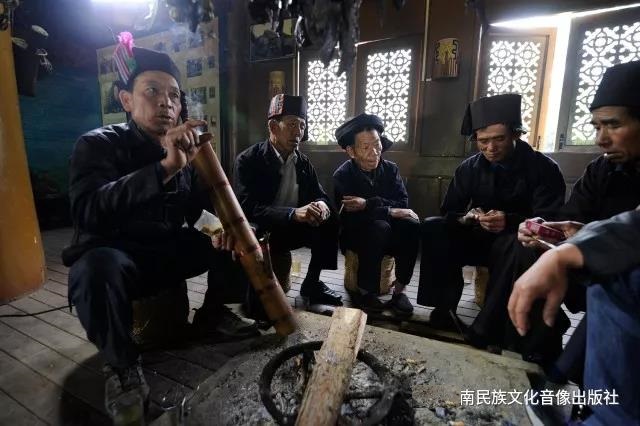As the kind of narrative rap without accompaniment, the singing contents of Hanibani including celestial nature, Hani’s history, celestial calendar calculation, four seasons, farming activities, commercial economy, religious beliefs and customs and so on, which almost cover all of Hani’s social activities. It is the encyclopedia with no words of Hani people.
In Hani people’s thoughts, “Haba” is Hani’s ancient rule, in other words, it is regulation. People who do not know “Haba” cannot be real Hani people. Therefore, every Hani cares about this sacred cultural tradition of his or her own ethnic from early age. Although there is no one teaches them, even no words can be read, the younger generation listen carefully what the old people of good knowledge and have rich life experience sing in the occasions of festival event, daily life or production. They try to remember this precious wealth.
“Hanihaba” entered the second national intangible cultural heritage conservation list in 2008.Things like the creation of world, multiplication of ethnics, origins of history, ethics and morality, matrimonial etiquette, celestial phenomena of four seasons, events of festivals, agricultural production, livestock and the five cereals and so on can be included in Haba, but flirtatious and dissolute word is prohibited. Most of the time, people sing Haba in the occasions like festival day, harvest festival, entertain friends, wedding, new completion of house, while people do not sing Haba in daily life. And singing Haba in funeral and sacrificial activities is prohibited.
The Hani people call the behavior of singing Haba as:“Re,ka,yi,zi,shuai”,etc. All of those words can be used as verbs which have the meaning of singing. Hani people have the custom of inviting guests and friends in the occasions like wedding ceremonies, sacrifice the ancestors, festival events, build of house. And they sing “Haba” in those occasions to tell their family and friends, village people rules and truth, or giving good blessings. The style of singing Haba is there is one person be the lead vocal while others be the backing vocals, or two duet sing like ask and answer interchangeably and others be the backing vocals. If there were important festival events, the main content of the twelve tones can be sung completely, it is difficult for one person to finish it, and it has to be many singers to sing it together.
The singing content is different based on different event. When the food and alcohol on the table, the elderly hunkered down on the bench, and ask the guests to start eating and drinking. After drinking for three rounds, the elderly lifts the bowl of wine and sings “Sayi” to pull open the prelude of singing Haba. When the elderly who is main vocal sings to a time of a paragraph, people sitting around him sing together and drink to add the fun, or start duet based on what the elderly sings. The atmosphere is very warm and harmonious, sometimes people couldn’t stop singing even it is late.
The title of Haba is “Nuju”.In Hani’s language, “Nuju” means chapter. Twelve Nuju means songs of twelve chapters. One Nuju including several singing contents that not only have connections but also can independently exist, which is the source of “12 Nuju, 72 Haba”.


Photo|Xiaohe Zhu(Left one below),who is the main inheritor of the national intangible cultural heritage protection of “Hanahaba” and “The four seasons producing song of Hani”
From the types of literature, classification of section, characteristic and lyrics, Hanibani has both long ancient song and extemporaneous short song. The lyric of it is colloquial and has different length, but it has rhyme. From the language of Hanibani, the language of it is unsophisticated, the imagination is super and natural, artistic conception is enormous and profound, which reflect Hani’s great mind, excellent pursuit of life, ability of changing world. It is a classic epic of oral literature.
Mopi are people who specialize in Haba. Because Hani people do not have word,the content of Haba is spread by Mopi by giving oral instruction and remember in heart. Besides, there are differences in dialect, almost every Mopi adds or changes some contents when they spread Hanibani. Haba passed on from generation to generation to become a tool for the Hani to preserve history
Mopi are people who stand at the second level in Hani’s social structure. They are smart, good at memory things, eloquent, familiar with the traditional knowledge and social history, who can be the inheritor of Hani. At most time, there are two ways to select inheritor of Mopi, one way is recommended by people, the other way is hereditary inheritance. Xiaohe Zhu, who is the main inheritor of the national intangible cultural heritage protection of “Hanahaba” and “The four seasons producing song of Hani”, became inherit through the latter way.
“Haba” is the most important artistic form of Hani’s oral tradition, which bears many important folk culture, folk wisdom and local knowledge of the Hani people. However, no matter in traditional community or in educational circles, some questions about “Haba” are still in the study.
Meanwhile, with the change of society, especially with the influx of foreign strong culture, the young people of Hani ethnic group have been indifferent to the farming culture of terraced fields. How to form intergenerational communication and dialogue, find out the similarities between their world outlook and behavior patterns, and seek the possibility of traditional culture inheritance in different situations and different groups will be a long-term exploration process.
“The art of folk singing in Yunnan-Hani’s folk ballad <Hanibani>,eleven oral singing art of nine ethnic groups in Yunnan” which was filmed, produced and published by Yunnan ethnic culture video and audio publishing house in 2013 faithfully reflects the true original appearance of minority literature, vigorously promotes the excellent traditional folk oral culture and art in Yunnan, which was awarded the third Chinese government publishing award.


